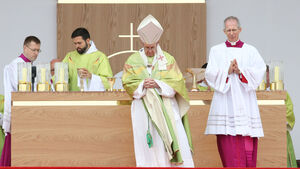Fallon's Town Talk: The death of a good man reverberated around the world

Pope Frances says Mass in Phoenix Park during the second day of his visit to Ireland. Photo: Sasko Lazarov/RollingNews.ie
The death of Pope Francis was a shock but not a surprise. That sounds paradoxical but, after the world had been on a death watch for almost two months, it looked like Francis was out of immediate danger when he attended ceremonies on Holy Thursday and Easter Sunday.
For him to pass away less than 24 hours after his last public appearance was a jolt, yet somehow apt and not just because it was at Easter. The 88-year-old came across like many an Irishman of his generation who wouldn’t listen to doctors’ advice and carried out his duties right up to the last hours of his life.
Our family was among the 45,000 pilgrims who went to see Francis in Knock on a lashing wet day in August 2018. We were pleasantly surprised at how close we got to the pope as he went through the crowd in his distinctive popemobile.
That 2018 visit showed how different Ireland had become since the visit of John Paul 11 in 1979. Far fewer people turned out to see Francis than his famous predecessor. So much had happened in those four decades, most notably the revelations about the horrendous abuse scandals. Survivors who met the pope during his visit reported that he was shocked and appalled by their stories.
As Francis’s condition deteriorated in recent months, I wondered how the world would react to his passing. In 2005 John Paul’s death received wall-to-wall coverage. Between two and four million people turned up at St. Peter’s Square, making his the largest funeral in history.
Twenty years later, the prospect that the death of a pope would be as seismic an event seemed remote. Yet, in a much-changed world, 250,000 mourners filed past the pope's coffin. Despite the news environment having altered beyond recognition, it was a momentous, historic story which reverberated globally.
The extensive scale of RTÉ’s coverage was on a par with that given to John Paul. That the President, Taoiseach and Tánaiste all went to the Vatican indicated this was a significant moment for plenty of Irish people.
The Argentinian pope did create divisions within the church. Francis was the first pope to utilise social media but also the first pontiff to be vilified on social media. The vitriol directed towards Francis by some conservative groups on Twitter, now X, got so vicious that they refused to acknowledge him as a legitimate pope, calling him by his surname ‘Bergoglio’ rather than his papal title.
In contrast, many liberals who were energised by Francis’s election in 2013 became disappointed with the slow pace of change. On a host of major issues it turned out that the pope was, in fact, a Catholic. It is a reminder that there is only so much any pope can achieve in the course of a pontificate.
Francis recognised that Europe is no longer the heartland of Catholicism. The Church is growing in the global south as it continues to decline in the west. His South American background explained why climate change and global poverty were such prominent themes of his papacy.
He struck up a good relationship with President Michael D. Higgins and, apparently, also got on well with former Taoiseach, Leo Varadkar. He was a keen football fan who must have been delighted at Argentina’s World Cup win in 2022.
Away from the online furore, Francis was popular with ordinary people because of his decency, kindness, humility and empathy, especially for the poor and marginalised, but also his humour and toughness – and he had to be tough to deal with the Roman Curia.
It was poignant to read that his nephew couldn’t afford to go to the funeral until his flight was paid for by a private donor.
Francis wasn’t a noted orator; instead he was a master of gestures which spoke eloquently. That he made a WhatsApp phone call to the beleaguered and dwindling Christian community in Gaza every night for the last 18 months was archetypal Francis.
The extraordinary outpouring of sadness and affection at his death was a throwback to the excitement generated by his election and the heady early years of his pontificate. He now enters the pages of history and it will be some time before his legacy can be determined.
Francis signalled his intentions from the start by taking a name not associated with popes. Instead, Francis chose to be called after a saint synonymous with helping the poor and living out the Gospel in a humble manner. In that respect, Pope Francis lived up to his name. May he rest in peace.





